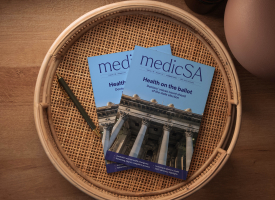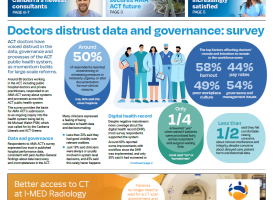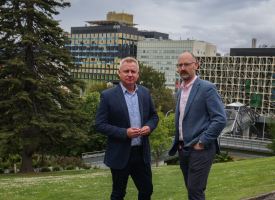You Deserve More campaign
Transcript: AMA President, Professor Stephen Robson, on ABC 666 Canberra, Wednesday, 12 April 2023 Subject: Launch of AMA You Deserve More campaign

ROSS SOLLY: Few people having their say already on the AMA launching its campaign today. The campaign's called You deserve more, basically saying that going down the path of allowing pharmacists to do more work that GPs normally do is a slippery slope to visit the devil. Steve Robson will join us in just a moment but some texts on this first of all. Russ says: “I once went to a GP to get jabs before travelling to South America. To find out what I needed, the GP Googled the exact same pages I looked at that morning. I paid someone $80 to Google something and put a signature on a sheet. I trust pharmacists are switched on enough to do the same and you could get it all at the same place,” says Russ. Another texter, though, says: “I'm a pensioner. I try to get a flu shot from local pharmacies, but they wanted to charge a $15 administration fee. It's the first time I've encountered this.” Another texter says: “Just another power grab by the Pharmacy Guild.” “I'm with the AMA”, says this texter. And someone else says: “Someone please ask the AMA what they think of our walk-in centres.”
Okay, well, the person to ask is Professor Steve Robson. He is the Australian Medical Association's national president and he joins me. Professor Robson, good morning to you.
STEVE ROBSON: Good morning, Ross.
ROSS SOLLY: So, I'm sure you're aware that here in Canberra, we've had a trial now that's been going on for a month or so. Do you support this trial? Do you think this is a good thing?
STEVE ROBSON: No, I don't support the trial. I think that one of the ways that everybody can work together is there are certain models around in which pharmacists work with GPs as part of a practice, and those models work really well. But just autonomous prescribing, where people arrive at a pharmacy, are treated like a customer at the front counter, they're just not conducive to good medical care. And we have some ideas that will make it much cheaper to get medicines, much easier, take the pressure of having to go to GPs, that we think are a better way forward, Ross.
ROSS SOLLY: So, are there services that you would be prepared or the GPs would be prepared to offload to pharmacists?
STEVE ROBSON: Absolutely. There are great models where as part of a general practice or a medical practice, pharmacists work as and a part of the practice, and we've seen models like this working in various places around the country. They're really safe, they're very accessible. But just giving community pharmacists carte blanche to look at you, decide what you've got, prescribe and then dispense medications, we think is not in the best interests of Canberrans or anybody around the country, Ross.
ROSS SOLLY: Why?
STEVE ROBSON: Because there's a very important separation that supported by the Pharmacy Board of Australia, by the Therapeutic Goods Administration. It says there should always be a step between the person who's providing the prescription for a medication and making a diagnosis. And that step two is another person gets the prescription and dispenses it. That provides a safety barrier and it also removes a conflict of interest, you know, the conflict that you want to prescribe more. Doctors don't get incentive if they prescribe something, so there's no financial incentive for them to do it. And also, they know your history. They can sit with you in some privacy. They can go through what the issue is and prescribe then. And then, we're all for going to a pharmacy somewhere and having that prescription filled.
ROSS SOLLY: Well, the trial here in the ACT at the moment, it just involves administering like the flu vaccine, diphtheria, tetanus, that sort of stuff, COVID-19 vaccines. I mean, that's alright, isn't it? What can go wrong there?
STEVE ROBSON: I don't agree with you, Ross. Unfortunately, lots of things can go wrong with these situations. So, we firmly believe that the opportunity to see a GP to organise these things is the way to go. And what we think is rather than - and we know what a difficult thing it is for people to have to go to their GPs all the time to get repeat prescriptions and things….
ROSS SOLLY: [Talks over] Yeah.
STEVE ROBSON: Let's forget about that. Let's dispense a couple of months' worth of supply of a single script, which means often, for a lot of medications, you need to see a GP once a year to get that script. It makes it a lot cheaper. People don't need to double up on the dispensing fees. And also, there's this crazy rule at the moment where if the pharmacists who want to do the right thing for their sicker patients and discount them are only allowed to discount $1. That just makes no sense to us and we think that it should be opened up so pharmacists who do want to provide discounts can discount as much as they want for their regular patients.
So there's lots of change that will take the pressure off having to go back to GPs, make medicines cheaper, and we think that's the way to go rather than just this siloed situation where you bypass your GP, you go stand at the front counter, get a consult, which by the way, doesn't seem to have a Medicare rebate for a lot of them. So we're very keen to make medications easy to get to, to keep people away from general practices to get things like repeat prescriptions. And we think there are better ways than the pharmacy trials.
ROSS SOLLY: You know, a lot of pharmacists are going to be very offended, Steve Robson, by this campaign because you're basically suggesting that they can't do the job. You say here that patients deserve more than trials that threatens safety and undermine Australia's world-class health system. That's not a big wrap for pharmacists.
STEVE ROBSON: Well, it's really interesting. We've tried to keep things as sort of evidence-based as we possibly can. The Pharmacy Owners Guild obviously wants more and more people in pharmacies, and we understand why pharmacy owners would want that to happen. But at the end of the day, we look at the evidence from around the world. We look at what the different trials around the world tell us, and we try to put patient convenience and patient safety as number one. And that's where we're coming from. We're responding to problems that we've seen right around the country as these trials. For example, in North Queensland, where there was a very broad-reaching pharmacy trial, there were major safety problems that prompted the Aboriginal-controlled health services there to complain and say we don't support this. We think it's better that vulnerable people actually have the opportunity to see a GP, but we make that the priority rather than giving them a sort of second-class service, which is what the Indigenous-controlled health services are saying in North Queensland. So we really back that.
ROSS SOLLY: Pharmacists are always going to be attractive for a lot of people though, aren't they, Steve Robson? When we have less GPs who bulk bill, the gap now is getting bigger and a lot of people can't afford to pay the gap anymore, and it's just quite difficult sometimes to even get an appointment for a GP. So there are three or four reasons there that would- you know, some people might wake up and think: “Oh, I could go and try and go through all that rigmarole, or I could just pop down to my local pharmacist.”
STEVE ROBSON: Yeah, and I think we saw this earlier this year when the state and territory premiers said access to general practice is a major problem. We need this sorted out. But rather than try and solve those problems to actually make general practice affordable, they've defaulted to a sort of second tier system, which is what the pharmacy prescribing is. We think that abrogates governments from actually doing what they should do, which is make general practice more affordable. And we've said one of the big reasons that people go to GPs is to get repeat prescriptions. We think we can solve that problem. Really, you should only have to go once a year, if we can extend that. We know that if pharmacy prescribing goes into pharmacists, there's actually no Medicare rebate for that. So we saw some media reports just a few weeks ago saying it actually could push up the cost of medications. And we say let's just make sure that the pharmacists who do want to do the right thing by their patients are actually given some scope to discount more than a dollar. We think lots of pharmacies would love to do that for the regular patients, but this crazy law says they can't. So there are lots of things that mean you have to go to a GP less and you can make medicines much cheaper.
ROSS SOLLY: It's 8:48 on ABC Canberra Breakfast. You're listening to Professor Steve Robson, who is the Australian Medical Association National President. Just talking about a campaign that the AMA is launching today. The campaign is going to be called You deserve more, and it's basically suggesting that people shouldn't pin their faith in a pharmacist and should continue to see their GP, in a nutshell, that's what the campaign is all about. Professor Robson, I might just read some texts out that we've received and if you want to comment on some of these, you can do. Texter says pharmacists are not doctors. I think that's a point that you've made, Professor Robson.
Another texter says doctor practices deserted Wanniassa and Charnwood, but the chemist has stayed in these lower income areas. “I'm not with the AMA on this one,” says Ben.
Mike says pharmacists always find it bemusing, getting a script filled by a pharmacist. “Aren't they just typing up a label to stick on a pre-filled container and asking you if you've had it before when it clearly shows this on the script because they tell you when it's run out.”
Rachel says, oh, this is I think this is our Minister, in fact. (Rachel Stephen-Smith) “The pharmacy vaccination changes are not a trial. They are permanent changes. The trial relates to a very short course of antibiotics for women with uncomplicated UTIs and potentially one repeat year of oral contraceptives. It is run by New South Wales Health in partnership with the University of Newcastle. The ACT Government is supporting, non-financially, the participation of about five ACT pharmacies.” So that's from our Health Minister, who's just texted in about that.
Andy says: “Having a disability, I've found doctors in Canberra very hard to feel safe with and understanding of my disability. I have more confidence and feel safer in a pharmacy than I do with a GP. Without access to a pharmacy for vaccines such as flu and COVID, I would not have been able to get these vaccines.”
Someone else says doctors are the siloed situation. Jodie says it would be good if the AMA were consistent with their messaging. “Every week, they're banging on about how overworked they are and how their numbers are dwindling, and yet they won't allow some less complex tasks to be conducted by pharmacists. Mere protectionism. They were the same with nurse practitioners. It's just ridiculous.” Well, I can't let that pass without you commenting on that, Steve Robson.
STEVE ROBSON: Yeah, look, I think all the texts coming in showed just what a critical issue it is for so many people in the community, and particularly vulnerable people. So that's why we really want to make sure that the most vulnerable people have access to the best care. And I agree completely about the pressures on general practice. These are really a Federal Government issue about how we can actually support and make general practice affordable and accessible for Canberrans. But I think bypassing it and giving an option that doesn't really give you the full range of treatment and diagnosis and care and ongoing care that your GP can, it doesn't really solve the underlying problems. And I agree with all of the input that's coming in here that it's a hot button issue for people. So we'd love to solve it. We've got great ideas to make it much easier to get care like this to free up and you don't have to pay and see a GP and things like that. So that's what the campaign is all about. I really encourage everybody to go to the campaign website. There's great stuff on there that you can have a look at.
ROSS SOLLY: A couple more text before I let you go. Aaron from Ngunnawal says: “I try to avoid the GP unless I absolutely have to. They're so underfunded that the ones that were bulk billing aren't anymore, and the ones that are generally rushed through, and I feel that I don't get the standard of care I deserve as a taxpayer.” And Helen says if the AMA wants people to stop looking for alternative ways of finding medical care, they need to reduce the cost of seeing a GP and make the GP actually know what advice to provide. “My GP has looked up Dr Google the same as your earlier texter. That doesn't prove any confidence that they know what they're talking about.” And someone else says: “Sadly, most GP practices are first and foremost run as moneymaking business.” That's the problem. I think what's coming through on these texts, Professor Robson, is that people see from their own experiences and they feel that GP's are doing it tough, and they're struggling to keep patients looked after the way they feel they should be, and part of it is that it's costing too much for patients to visit anymore. And so the easy alternative is to go and see a pharmacist.
STEVE ROBSON: So I think a big part of that, you've taken the words right out of my mouth. There is very little financial support at the moment for general practices. And keeping general practices up and running is a huge struggle. We've seen the closure of practices, particularly those like the co-op a couple of years ago who tried to bulk bill. They just could not make it work. So as I said at the very start, you know, we need to really support, we need to look to the Federal Government, and whatever state and territory governments can do to support general practices. But these pressures are going to keep continuing. It's going to make it difficult, particularly for the most vulnerable people. We really want to make it easier for people to see a GP, not have to see a GP so often, but to have safe care, and it's a big project. So I think all of the texts you're getting speak to how important this is to everybody in the community, Ross.



